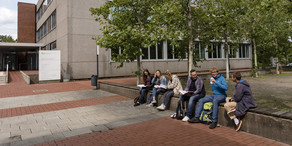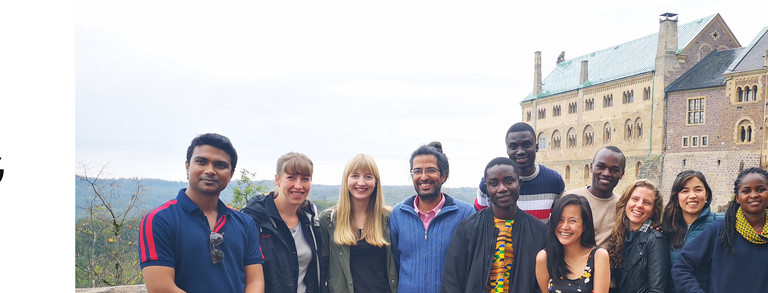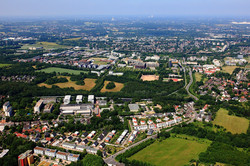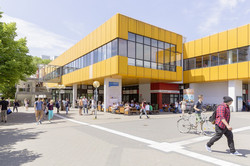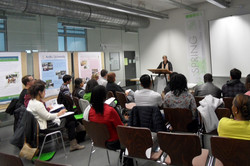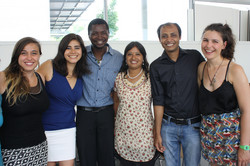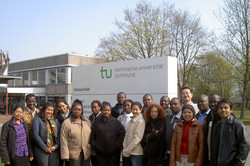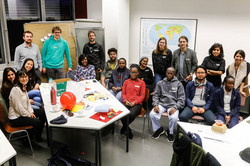About Master SPRING
History
The Department of Spatial Planning at the University of Dortmund and the Department of Planning at the Kwame Nkrumah University of Science and Technology in Kumasi, Ghana, launched the SPRING program in 1984. When the Asian Institute of Technology joined in 1989, SPRING expanded into a multilateral network. AIT was replaced in 1995 by the School of Urban and Regional Planning at the University of the Philippines. With the University College of Lands and Architectural Studies (UCLAS) in Tanzania, another African partner joined the network in 2002, extending the focus of the curriculum to urban planning and management. UCLAS meanwhile became an independent tertiary institution, the Ardhi University. In 2006, the SPRING network expanded to South America. The Universidad Austral de Chile complemented the program with a new focus on environmental economics in planning. Since 2020, the Universidade Federal do ABC in Brazil enriches the network with its special study focus on planning, governance and public policy for sustainable urban agglomeration.
Firstly accredited in 2007, the SPRING program regularly (2012, 2019) undergoes evaluations conducted by certified accreditation agencies.
Due to its outstanding performance, the SPRING program received an award in 2006 as one of the top 10 international Master’s degree programs offered by German universities.
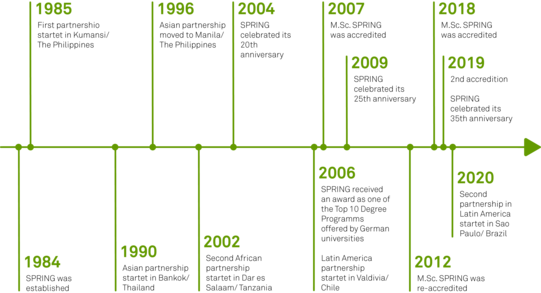
Objectives
The SPRING program combines teaching in development theories and strategies, planning concepts and methods, and implementation and monitoring tools with practice-orientated field studies aimed at elaborating regional development plans and programs in Africa, Asia and Latin America. The program content is based on the specific socio-economic problems in the developing world.
SPRING places its emphasis on development management at an intermediate level (e.g. district) between macro-regional and community-based planning. Development planning is seen as a problem-oriented management tool with the following objectives:
- to identify development problems, trends, resources, constraints and potentials
- to formulate development objectives, policies and strategies
- to design plans and programs
- to assess environmental impacts of plans and programs
- to organize target group participation and decision-making processes
- to apply instruments for program implementation and management and
- to evaluate and monitor plans and programs
Competences
A SPRING planner should be able to collect, process, analyze, interpret and compile social and economic data; to understand and critically reflect on concepts and theories underlying spatial development and planning; to project key social and economic indicators into the future; to translate target group requirements into land use plans, projects and programs; to understand at least the basics of all major sectors of regional development; to have a good command of planning, group facilitation and conflict resolution techniques; to critically appraise processes of spatial development at all levels against the backdrop of globalisation and accelerated urbanisation; to design and conduct planning-oriented empirical research; to write clear reports, manuals and memos.
Therefore, the SPRING program provides students with the following set of competences:
- a broad inter-sectoral knowledge and skills across three major regional development planning fields: natural resource planning, physical infrastructure planning and socio-economic development planning.
- the capability to design regional development activities in a pragmatic, problem- and action-oriented manner
- the competence in applying the three major action phases of the planning cycle: analysis, planning and implementation
- the ability to reconcile participatory planning from below with the requirements of planning from above and the framework set by national policies
- the capability to combine various personal characteristics such as logical thinking, flexibility, creativity, organisational and communicative skills
Achievements
The SPRING program prepares regional development planners and managers for employment in the public sector at central, regional or local government levels, private sector, NGOs and international organisations. About 750 graduates from over 70 countries have completed the program so far. They now hold leading positions in diverse fields such as teaching and research, regional development and urban planning as well as in national ministries and in the development sector.
SPRING Contact
TU Dortmund University
Department of Spatial Planning
SPRING
August-Schmidt-Straße 10
44227 Dortmund
Germany
Visiting hours
E-Mail
General: springtu-dortmundde
Application: application.springtu-dortmundde
Instagram: spring_tu.dortmund
LinkedIn: MSc SPRING
Phone: +49 231 755-6075





